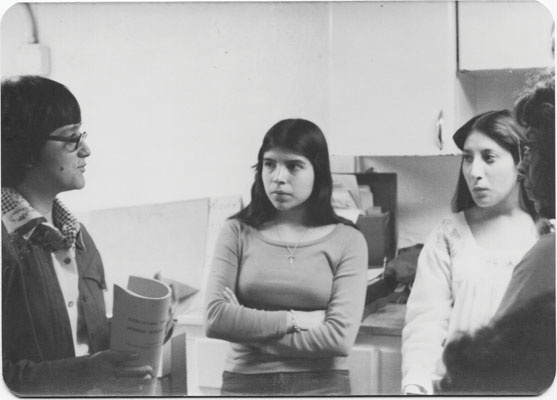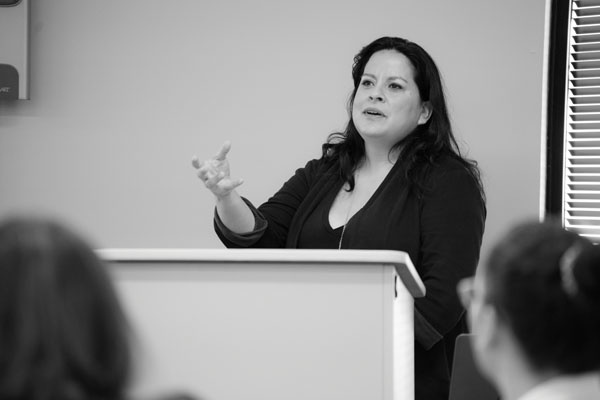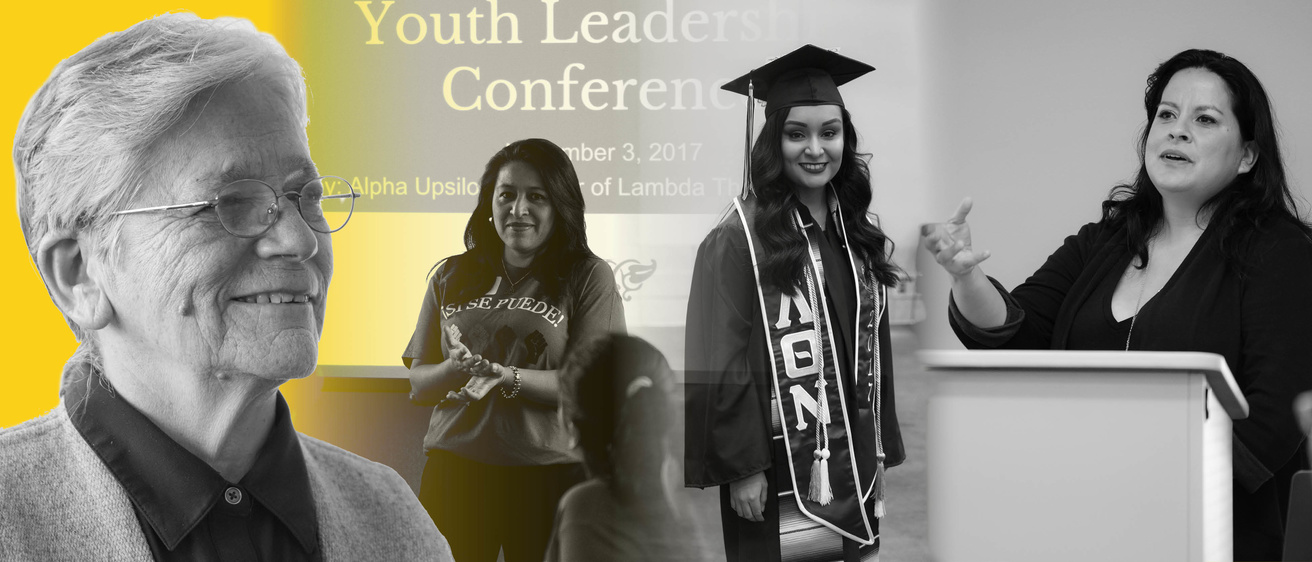Rusty Barceló serves as mentor for generations of UI students
Nancy “Rusty” Barceló has shaped history.
She has been a catalyst and champion for change in higher education – not just on the University of Iowa campus but across the nation.
Barceló – nicknamed Rusty because of the bright red hair on her head when she was born – grew up in California, surrounded by her Mexican heritage. She came to the University of Iowa in the 1970s to pursue a master’s degree. There were very few students of color, and she felt incredibly isolated that first winter.
“I called my mother and told her I was dropping out at the end of the semester, I was unhappy and it was too cold,” says Barceló, who identifies as Chicana. Her mother subtly guided her, telling her “Where there is one Mexican, there is probably another one.” The young Rusty was still adrift, but soon after their conversation, a care package arrived with some cultural icons: a Virgin de Guadalupe necklace, a serape, and some freeze-dried Mexican food, which didn’t survive the trip.
“I thought, ‘Oh, what’s my mother trying to tell me?’” says Barceló, who earned her master's and doctoral degrees from the UI's College of Education. “Years later, I would come to understand and appreciate what my mother was really trying to tell me – that who I was was important to where I found myself – and that I needed to find my community to survive and thrive.”
She didn’t drop out, but finding her community was easier said than done. Barceló along with two other students – Tony Zavala, the only other Chicano, and Ruth Pushetonequa, a Mesquaki Native American – had to build it first.
A lot of life

“The three of us started talking about what we could do to help the university – to make the institution more diverse,” Barceló recalls.
The trio ran into challenges and frustrations but ultimately found success – they created the Chicano Indian-American Student Union in 1971 and established a Cultural Center – in a building formerly occupied by the Spanish department – which quickly became a hub for activism. Today it is the Latino Native American Cultural Center, one of four cultural and resource centers on campus.
As students, they traveled across Iowa and the Midwest to visit high schools and community colleges to recruit other students of color. They talked to potential students and helped them realize their potential while also addressing the fears of their parents.
“Those folks would open their homes and hearts to us,” Barceló says. “The community was critical. They embraced us in ways that I never would have imagined. We had no money, but we had a lot of life.”
The process was influential for Barceló as well as for those whom she met along the way.
“I became educated in the communities of the Midwest, and I became more involved, not just with the Latino and the Native American communities, but with the other groups,” she says. “I would learn that Asians had helped build the railroads, about Buxton, the African-American community – substantial populations who had been there since the civil war because the underground railroad had passed through Iowa... then I just asked myself: Why were there only 42 students of color?”
This epiphany shaped Barceló’s career path.
“My whole life changed… and that’s how I became an educator,” she says.
Barceló went on to become the first Chicana to earn a doctoral degree from the University of Iowa, and she served in leadership positions at the university, including assistant provost and assistant dean.
"I was raised in the military, I knew about institutions, so I decided that’s where I’d do my activist work,” she says.
What followed – generations Chicana/nos and Latinx – a gender neutral term used instead of Latina or Latino – students who would come to the university because of Barceló and the groundwork she laid.
“When I welcome students … I always say we have a responsibility to not only develop their academic skills, but we have responsibility to develop all of their identities, whatever they may be,” she says. “ I was a bit of an oddity on many levels – I was this lesbian and a Chicana. We didn’t know about intersectionality back then.”
Still surprised by her own legacy, Barceló notes their work “helping to transform the institution has in fact benefited all students.”
Her impact has extended across the nation as her career flourished: she served as vice president and vice provost for minority affairs and diversity at the University of Washington and associate vice president for multicultural and academic affairs at the University of Minnesota. She also has served as president of Northern New Mexico College.
To honor her for her many contributions, Barceló received the University of Iowa Distinguished Alumni Award in 2010.
Though Barceló is now retired, she continues to be a leader in the higher education landscape. She served as a consultant to help the University of Illinois implement a diversity plan as they searched for a new vice chancellor to coordinate wide-ranging efforts to promote diversity.
This includes contributing her time and talents to the campus and community, serving in a leadership role with the UI College of Education's Anti-Racism Collaborative since its inception in 2020. Barceló is focused specifically on developing the antiracist leadership vision and skills of the college’s leadership team through her direct work with the college's administrative council. She has also led other trainings campuswide on diversity, equity, inclusion, and accessibility.
Today, Latinx students make up almost 8% of the population or 2,480 out of University of Iowa's 31,333 total students in fall of 2022 – making them the greatest share of minority students at the school, according to admissions data. There are sororities and fraternities for Latina and Latino students, as well as other organizations and resources designed to provide support, especially through the UI Division of Diversity, Equity, and Inclusion and the Division of Student Life.
UI was the first public university to admit students regardless of race, says Susan Dickinson, senior assistant director who oversees diversity recruitment through the Office of Admissions. She says that enrolling a diverse incoming class is a high priority. For Latinx students, the university has worked to translate the admissions website into Spanish while having admissions ambassadors assist with Spanish translations for campus visits and walking tours.
“We also host specific diversity events both on and off campus,” says Dickinson. “Every year we are also trying new initiatives to recruit diverse students to campus."
The Office of Admissions is continuing to partner with Multicultural & International Student Support and Engagement (MISSE) and the Center for Inclusive Academic Excellence (CIAE) to provide opportunities for prospective students from diverse backgrounds to engage with the campus community.
CIAE hosts the Latinx Youth Summit, where Latinx-identified high school students in grades 9-12 come to campus for a day of identity-focused workshops. This spring, the UI Admissions is planning to partner with these offices and others for a Multicultural Visit Day to showcase opportunities for student engagement and highlight our cultural centers, including the Latino Native American Cultural Center (LNACC).
The university has seen a rapid increase in the number of schools and community-based organizations bringing students from diverse backgrounds to campus before their sophomore year of high school, she says, so UI is working hard to develop meaningful and fun programs that “demystify college and inspire students to stay on a college-ready track."
The university continues to work on increasing the number of all minority students – but this is a dramatic increase since Barceló’s time.
Picking up the torch
Barceló was a driving force behind Gabriela Rivera’s (MA ’99) desire to come to the University of Iowa. Originally from Mexico, Rivera came to Iowa in 1988. She graduated from a high school in Davenport and had cousins attending the university that she would frequently visit.
And when she visited, she would constantly hear about one woman – Rusty Barceló – and how impactful she was. So, when Barceló gave a talk at St. Ambrose University in Davenport, Rivera decided to go.
“I remember sitting in the audience and listening to the message she was giving about recruiting more Latinx students to the university and feeling very inspired by her work,” she recalls. “Through that experience, I had an even greater desire to be a student here.” Rivera is now the assistant director for diversity, inclusion and student success at the University of Iowa’s Tippie College of Business.
“Her vision is very important for those of us who are still here – to keep things going,” says Rivera. “She’s a Cultural Center founder – to me that house is so important for building community and preserving cultural identity.”
Rivera, who also worked as an undergraduate admission counselor, says she feels loyal to Barceló’s tradition of recruiting in Spanish. “Sometimes the language barrier can be such a huge thing when talking to a family about the process,” she says.
Culturally, Rivera explains, it’s still very difficult for Latina women to leave their homes and attend college. They don’t always have the confidence that they can achieve that goal, she says, because they don’t see other women with a college education. That’s also why she advises the Lambda Theta Nu, a Latina sorority that focuses on academic excellence.
“I feel so connected to Rusty,” she says. “I’m picking up the torch and saying ‘Yeah, let’s do this.’ This is something we have to do as a community.”
Through the sorority, Rivera has met students such as elementary education graduate Ismenia Castelan (BA ’17), who organized an annual youth conference six years ago to encourage local Latina middle school students to pursue advanced degrees and take on leadership roles.
Castelan currently works as an English Language Learner (ELL) teacher at Northwest Junior High School in Coralville, in the Iowa City Community School District, after working in several other Iowa school districts after graduation.
It is seeing first-generation students like Castelan attend college, graduate, and succeed that show the lasting effect of Barceló's legacy.
Inspired by the next generation

Carla Gonzalez (BA '05, PhD '19) didn’t know about Barceló when she started her research. But it didn’t take long for her to discover the legacy she left behind.
Gonzalez studied the educational experiences that Latinx students have in both the K-12 and higher education systems. While researching her dissertation as a doctoral student in Educational Policy and Leadership Studies, she came across a treasure trove in the UI Libraries’ Iowa Women’s Archives – Barceló’s papers, which provide insight into Latino life and culture in Iowa and across the Midwest.
Gonzalez read about all the things Barceló did on campus and how she worked with Zavala and Pushetonequa to start the Cultural Center. “This was so incredibly important because having a space to be around others that look like you and have the same cultural background,” Gonzalez says, “gives you room to be yourself.”
“You think of people who are trail blazers – and you imagine they have these grandiose personalities,” says Gonzalez. “But you can be extraordinary in your ordinary life.”
Barceló’s words and work inspired Gonzalez to act.
“It is imperative to start shifting that conversation from the black and white binary,” she says. “There are other groups needing services like Latinx, Asian American, and others.”
So, Gonzalez, along with the help of the college’s diversity committee and office of the dean, developed the Latinx Educational Excellence in the Midwest Conference. The first-ever conference, which took place in October 2017 and was held in partnership with the annual Latinx Youth Summit, shared best practices in addressing educational needs of Latinx students. More than 200 people attended, and the second annual conference drew even more participants in fall 2018.
Iowa’s Latinx population is poised to grow, accounting for 12.8 percent of Iowa’s total population by 2050 according to the State Data Center of Iowa.
“Statistics show that the average teacher, demographically speaking, is a white female from a middle-class background,” Gonzalez says. “I’m not saying that’s bad, but statistics show that nationally, 50 percent of students are students of color, and yet the teaching force is predominantly white.”
The number of minority students in Iowa’s public schools is increasing while only 2.5 percent of the state’s teachers are a minority.
The conference’s goal was to help build community and pool resources focused on increasing the success and participation of Latinx students, staff, administrators, and faculty in K-12 and higher education institutions in the Midwest.
“Having teachers be more aware of cultural differences ... will be helpful and make them more flexible on knowing the students’ needs,” says Gonzalez, who currently works as a literacy specialist at the University of St. Thomas in St. Paul, Minnesota, where she mentors and develops the academic potential of students from diverse backgrounds.
Faculty and staff at the College of Education share and support this goal. “Increasing the diversity of our teacher workforce is a primary concern and part of our responsibility to the state, which is why it is a high priority for our college,” Dean Dan Clay says. “Rusty’s pioneering work is continuing to guide us into the future. Our strategic plan focuses on this important outcome, and we have already begun new initiatives in the college focusing on increasing the number of teachers from diverse backgrounds.”
This is why every student who completes the Teacher Education Program is required to obtain a Teacher Leader Certificate. The certificate is a series of competencies and experiences in the areas of assessment, technology, cultural competency, and community engagement offered through workshops and community partnerships.
This also includes several student-to-teacher pathways programs the college has developed to recruit and retain more educators of color, including teachers and administrators, among other professionals. Alumna Amira Nash (BA '17, MA ' 19), the college's associate director of partnerships and programs in the Baker Teacher Leader Center, works with several different groups, including Educators Rising, to recruit more BIPOC students to the profession - and retain them.
Hope and resilience
Gonzalez says she is inspired by the next generation of Latinx students and the work they’re doing on campus – such as the literacy initiatives the Latina sorority is engaged in.
“When I feel depressed or think the world is turning bad, I look to that and feel there’s a lot of hope,” she says, “for everyone, not just the Latinx community.
Barceló shares this sense of hope and resilience. She didn’t give up after that first isolating winter when she was in Gonzalez’s shoes as a graduate student. Instead, she stayed in Iowa for another 20 years, pushing for a great deal of change along the way.
“We have changed higher education forever,” says Barceló. “The curriculum is more diverse because of us, you have daycare policies in place because more women started coming, and grievance procedures were put in place because of the work of the disenfranchised.”
Barceló is quick to give credit to many others in the community who have helped to create a more inclusive environment in higher education. And it also gives her hope to see students like Gonzalez and Riviera continue to carry that torch into the future.
Though there is still critical work to be done, she is hopeful people will continue to ask the question: “How can diversity continue to be a strategic tool for the continued transformation of higher education?”
Read more of the College of Education's 2018 Alumni Magazine.
Note: Although this story was originally published in the College of Education's 2018 Alumni Magazine, it has been updated in September of 2022.
